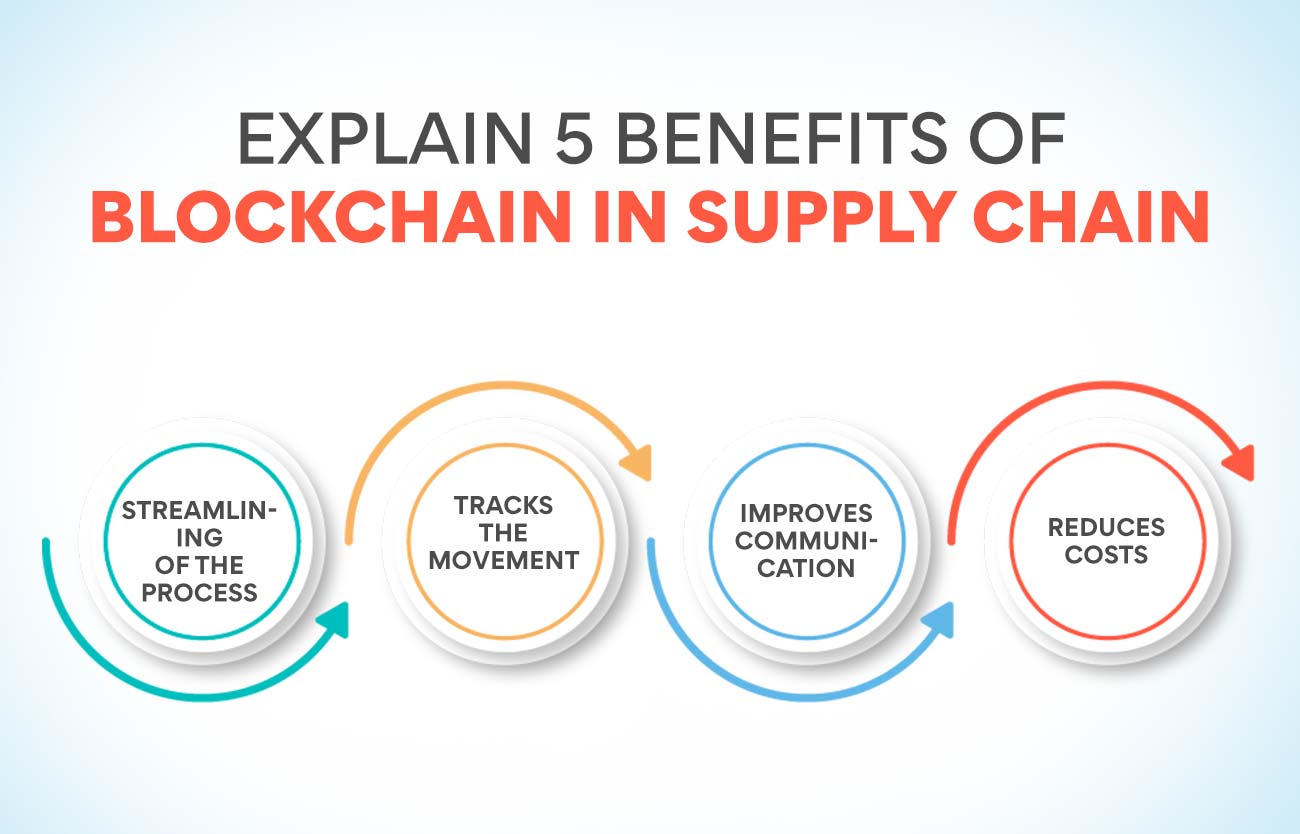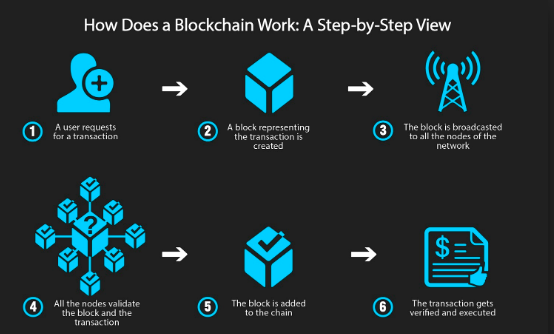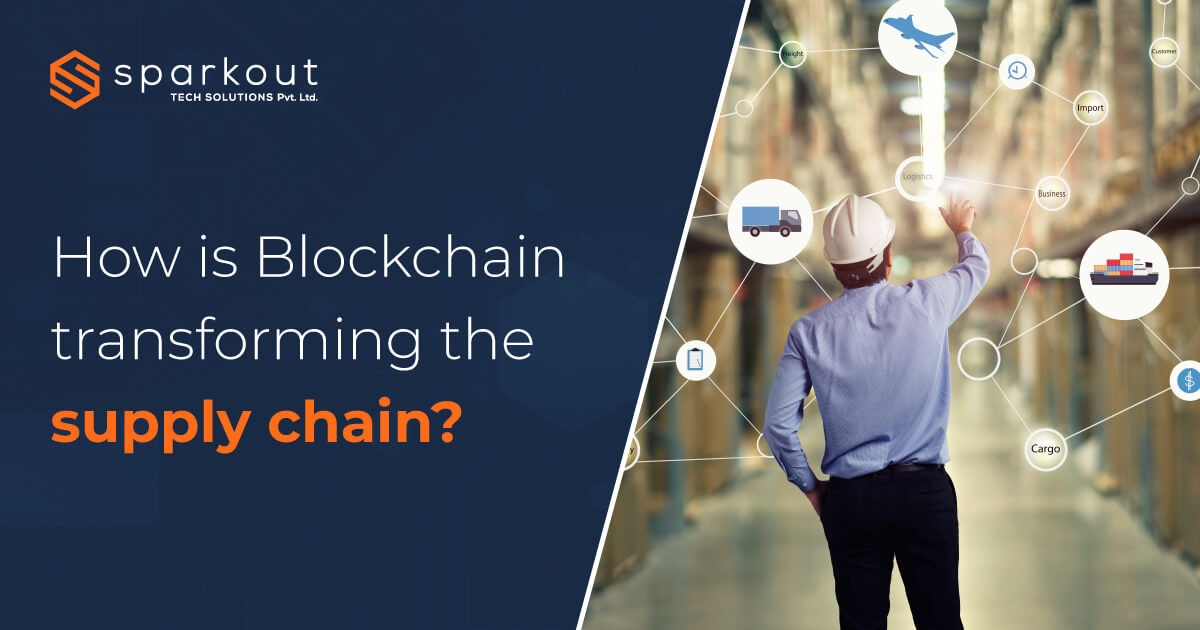Blockchain and Supply chain: Do these terms go together? The answer would have been no up until a few years ago. However, as blockchain demonstrates its potential to revolutionize the supply chain landscape, its position in supply chain management is becoming a growing topic of attention. Besides its use in the crypto space, blockchain in supply chain management has a huge number of capable solutions. In fact, the world considers blockchain to be the most important technology since the internet. Dreamy words, but how true are they and, is blockchain technology capable of addressing real-world supply chain risks and challenges? Can this revolutionary technology add value to the supply chain industry?
So, let's take a look at how blockchain is transforming the supply chain ecosystem.
Blockchain in Supply Chain
A blockchain in the supply chain is an innovative solution to a wide range of issues. Various processes are involved in a typical supply chain, such as raw material procurement, manufacturing, financing, and so on. These processes may occur in one or more transactions.
These one or more transactions are recorded on different blocks in a blockchain supply chain. These records are then distributed over the blockchain's network of computer systems, making the data extremely accessible and transparent. Every stakeholder in the supply chain is an active participant in every transaction since every transaction is recorded on the blockchain and reflected in real time.
Why do we require blockchain in the supply chain?
One way that this technology can significantly enhance supply chains is by enabling faster and more cost-effective product delivery. The workings of blockchain technology can also be utilized to improve product traceability, co-ordination among the partners involved, and access to financing.
Using this powerful technology, parties collaborating on a single shared platform can significantly reduce delays and costs while eliminating the possibility of human error, which is frequently associated with transactions. This reduction in supply chain mediators also decreases the dangers of fraudulent activities. In case of fraud, the extensive records made available by the use of blockchain technology can help organizations locate the source.
Benefits of using Blockchain in Supply Chain

Implementing blockchain technology in supply chain management has a number of benefits, including:
Improved Traceability, Transparency, Trust
The blockchain's fundamental feature is its transparent and immutable record of each and every transaction within the supply chain. This enhances accountability and reduces the risk of fraud by allowing things to be traced from their origin to their destination. This also increases supply chain transparency and allows businesses to trace products and analyse performance in real time. This, in turn, can increase trust among supply chain participants.
Increased efficiency leads to increased speed
Blockchain technology may improve efficiency and lower costs by automating various activities in the supply chain. Payments might be automated, inventory levels tracked, and logistics operations streamlined. It also opens the way for another essential component: the need for speed.
Reduction in costs
The current supply chain ecosystem includes many intermediaries and a middleman, which raises the supply chain infrastructure costs significantly. Without the use of intermediaries, blockchain allows for real-time tracking of a product across the supply chain. As a result, the overall cost of transporting things in the supply chain is reduced. Many experts believe that the greatest benefit of blockchain in supply chain management is cost reduction in the supply chain.
Improved Security
Blockchain technology is increasingly being used in the supply chain management business to improve security and reliability. A record of every transaction in the supply chain may be securely saved and traced using the blockchain. This reduces errors and fraud while increasing transparency in the supply chain process.
Furthermore, blockchain's decentralization and cryptographic encryption help protect sensitive customer information from potential hacks. Businesses that use this cutting-edge technology not only improve their security practices but also get a competitive advantage in an ever-changing market.
Better customer relationships
Consumers can learn everything they need to know about the product they're using by the blockchain. By making the order tracking process transparent, blockchain for order management plays a significant role in improving the customer experience. Customers can also check the legitimacy of their transactions. This is building trust between consumers and the various brands.
Blockchain's Challenges and Limitations in Supply Chain Management
While blockchain technology has many potential advantages for supply chain management, there are also a number of difficulties and restrictions to take into account:
Integration with Existing Systems
One of the most difficult hurdles for businesses trying to implement blockchain is integrating it into their existing systems. This can be a time-consuming and complex procedure, especially if the organization has many old systems in place. As a result, most businesses will require time and money to make sure that their systems are effectively linked to the blockchain.
Cybersecurity and data privacy concerns
Businesses need to be aware of any possible security concerns related to the use of supply chains in blockchain technology. While distributed ledger technology is inherently secure, malicious actors can still exploit vulnerabilities to compromise data and networks. The same is true for data privacy; there is still a chance that sensitive information will be revealed if necessary safeguards are not taken due to the blockchain's transparency.
Companies must guard their systems against security risks, data breaches, and criminal actors. Regardless of whether the blockchain is involved, cybersecurity measures like firewalls, identity verification, and encryption should be vital components of any security protocol.
Scalability Issues
The more businesses adopt blockchain technology, the more the issue of scalability grows. The current infrastructure may be incapable of handling huge numbers of transactions without experiencing major delays or other performance concerns. This difficulty is inextricably linked to integration into legacy systems.
Uncertainty in the Legal and Regulatory Systems
Since blockchain technology is still in its early stages, there is some uncertainty about how it will be regulated in various jurisdictions. Companies that seek to use the technology face legal and regulatory concerns as a result. Organizations must be aware of any regulatory developments that may impact their use of blockchain technology.
Cost Considerations
Finally, using blockchain technology in supply chain management has financial implications. Businesses must take into account the long-term costs of creating and sustaining a blockchain network, even though the potential benefits are significant.
And, because blockchain technology is still in its early stages, there are only a limited number of developers available.
Best practices for successful blockchain implementation in Supply Chain Management
Despite these challenges, supply chain management can use blockchain technology in a successful manner. Businesses must to adhere these best practises:

Companies may successfully integrate blockchain technology into their supply chains and take advantage of its numerous potential advantages by adhering to these best practices. Having the appropriate technology partners or experts on board to help them through the implementation process is one of the most crucial factors. Companies can make sure that their blockchain investments are profitable and deliver long-term value by utilizing their expertise.
Future Perspective: How will blockchain transform Supply Chain Management?
Blockchain technology is already transforming supply chain management, but its influence is just getting started. Here are some future predictions for how blockchain will impact supply chain management.
Greater Adoption
We should expect to see more use of blockchain technology across the whole supply chain as more businesses see its benefits. This will result in a more integrated and efficient environment, which will benefit everyone involved.
Increased IoT Integration
When it comes to an interconnected ecosystem, the Internet of Things (IoT) is already being utilized to track items and analyse performance in numerous supply chains. IoT devices can provide even more transparency and traceability inside the supply chain when combined with blockchain technology.
Increased Sustainability
In the future, companies will be required to provide more information about the social and environmental consequences of their actions. As a result, blockchain technology will aid in supply chain sustainability by making it easier to manage and verify sustainable practices such as fair trade, wages, and ethical practices.
Emerging new business models
As blockchain technology evolves, we may see totally new supply chain business models emerge that take advantage of its unique features. One example of a new business model is food safety. The IBM Food Trust platform uses blockchain technology to improve transparency and traceability in the food supply chain. It enables food producers, processors, distributors, and retailers to track and share information about food product origin, quality, and safety. In this way, tainted or dangerous items can be discovered and sorted out quickly and precisely, reducing the risk of foodborne illness and the impact of food recalls.
Blockchain and Supply Chain: The Ideal Combination
Blockchain technology provides the values of supply chain reliability and integrity (efficiency and transparency)
Efficiency
Blockchain improves global supply chains by allowing businesses to perform transactions directly and without the involvement of third parties. It also allows for more integration of financial and logistical services, allowing for greater data exchange among stakeholders.
A proper and timely product flow is ensured through integrated payment systems, which reduce the time between ordering and payment processing. Furthermore, blockchain and smart contracts assist businesses in improving compliance, reducing legal fees and fines for late tax payments, and combating counterfeiting and fraud.
Transparency
Since blockchain records cannot be erased, it creates a transparent supply chain. Additionally, every step of the supply chain is securely recorded, making it simple to identify the root cause of logistics problems. The same may be said for obtaining raw materials or components that can be used to trace their source, increasing accountability and transparency and bringing down illegal activity.
According to one study, blockchain's ability to confirm the origin of a commodity may increase global GDP by 800 billion euros. Having more knowledge about a product's creator, transfer, origin, and use helps promote supply chain trust.
Top supply chain companies applying blockchain
With so much on the table from blockchain, many organizations have taken the opportunity to improve their practices. The following use cases illustrate how blockchain technology has impacted worldwide supply chains:
PepsiCo launched Project Proton, a blockchain pilot. It featured components of the company's programmatic advertising supply chain that were automated through the use of smart contracts. Project Proton employed smart contracts to collect ad impressions from numerous data sources, permit real-time payments with digital tokens, and achieve a 28% boost in efficiency.
Tomcar, an Australian car manufacturer, has used Bitcoin to pay some of its suppliers. They also accepted crypto token payments from three of its clients in Israel and Taiwan, eliminating the need to pay any foreign payment fees.
The ability to trace products back to their origins is making it difficult for the food industry to make the most of blockchain technology. Walmart, one of the world's largest retailers, has incorporated IBM's blockchain-based Food Trust to track their products at every stage of the supply chain. Nestlé, Tyson Foods, Carrefour, and Raw Seafood are among the other popular brands that use Food Trust for this purpose.
Final Thoughts
Without a doubt, blockchain is a game-changing technology that is worth investing in for supply chains. Indeed, enterprise blockchain technology is an investment that promises a high return. Smart organizations are experimenting with using blockchain to improve supply chain efficiency.
We at BlockchainX strive to deliver continuous technological innovation to your organization by harnessing the possibilities of Blockchain and Supply chain.
Our aim is to use blockchain to ease supply chain management and other platforms.
Drop us an email to find out how we can assist you and your company.
 Translate
Translate


















Author Bio
Yokesh Sankar
CO-Founder
Yokesh Sankar is the co-founder and chief operating officer of Sparkout Tech. He believes in changing people's lives for the better and developing the skills they need for success, and that the software industry has endless possibilities to streamline virtually any industry you can imagine. In addition, he is also an advocate for the adoption of blockchain technology, helping businesses of all sizes to realize their visions through this revolutionary technology. He will be sharing everything he has learned over the years working in the industry, and he hopes to open out as much knowledge about the software industry as he can.